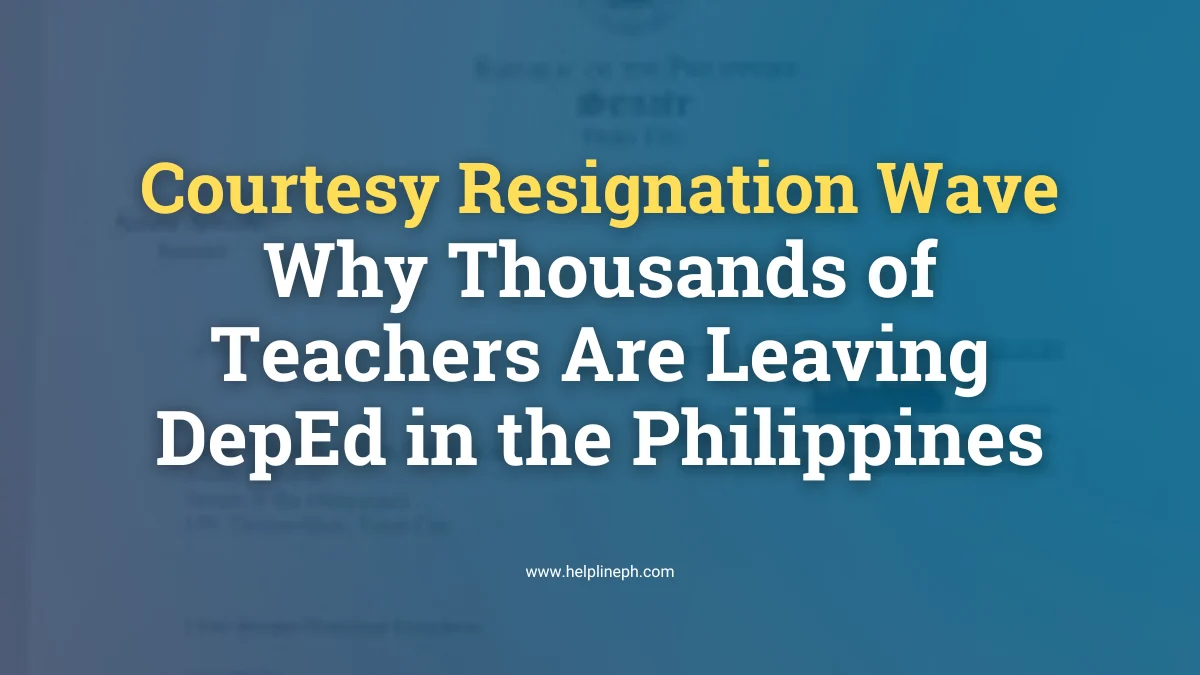Courtesy Resignation isn’t just a buzzword in Philippine politics—it’s become a heartbreaking reality in our schools. Over the last few years, thousands of teachers across the country have submitted their courtesy resignations, walking away from classrooms, students, and the careers they once loved. And if we’re honest, this isn’t surprising. It’s painful, but it’s understandable.
As someone who grew up in a public school system and had the privilege of being taught by some of the most hardworking, passionate educators, this trend feels personal. What’s happening isn’t just a professional crisis—it’s an emotional one. We’re losing teachers not because they stopped caring, but because they’ve been pushed too far.
The Real Numbers Behind the Teacher Resignation Philippines Crisis
In just one year—between 2022 and 2023—over 30,000 teachers and education staff have left their positions in the Department of Education (DepEd). And this year, the number continues to rise. As of mid-2025, we’re looking at a 30,000-teacher shortage nationwide.
That’s not just a statistic. That’s 30,000 classrooms that might be missing guidance, empathy, and structure.
Let that sink in.
Why Are Teachers Resigning?
Let’s talk about the root causes. Because when someone gives up a job they trained for, sacrificed for, and cared deeply about, you know something’s gone wrong.
1. Low Salaries Compared to Demands
Many teachers in the Philippines earn salaries that barely cover their daily expenses. Despite the noble nature of their profession, they’re often forced to live paycheck to paycheck. Meanwhile, their peers in other countries earn two to three times more for the same work.
Some teachers told me they love teaching but can’t afford to keep doing it. Overseas opportunities offer better pay, and sadly, survival beats passion.
2. Too Much Paperwork, Too Little Time
Here’s something that frustrates a lot of teachers: instead of focusing on students, they’re drowning in non-teaching tasks—reports, forms, evaluations, and endless documentation. This administrative overload burns them out.
“I became a teacher to teach, not to be an office clerk,” one teacher told me. She resigned last year after 12 years of service.
3. Poor Working Conditions
Many public school classrooms are overcrowded, under-resourced, and in dire need of repair. Imagine handling 60 students in a classroom with broken fans, outdated textbooks, and no support. It’s no surprise that some teachers feel their mental and physical health is on the line.
4. No Clear Career Growth
Even after years of service, promotions are rare. Many educators feel stuck in their roles with limited professional growth. That stagnation is enough to drive even the most passionate teachers out.
The Emotional Toll on Teachers and Students
Let’s be clear—teachers aren’t just quitting jobs. They’re leaving behind dreams, relationships, and sometimes, a sense of purpose. Many cry on their last day. Some wrestle with guilt. But staying feels impossible.
And students? They’re caught in the middle. When a teacher leaves, kids lose more than an instructor—they lose a mentor, a role model, sometimes a second parent.
What Courtesy Resignation Means in This Context
In government circles, a courtesy resignation is a graceful way of stepping down, often to allow leadership to “restructure” or “realign” strategies.
But when teachers use this term, it feels ironic. Their resignations aren’t strategic—they’re desperate. They’re a final act of self-respect.
Still, many submit their resignations quietly, respectfully, even apologetically. Because that’s how teachers are—kind, patient, and dignified to the end.
DepEd’s Response: Is It Enough?
To be fair, DepEd has acknowledged the crisis. They’ve opened up 16,000 new teaching positions for 2025 and promised to reduce paperwork through digital tools. But these efforts, while commendable, feel like a band-aid on a deep wound.
What we need are bold reforms:
- Increase teacher salaries to a living wage.
- Reduce administrative workload.
- Improve classroom conditions.
- Offer real career paths.
Until then, the resignations will continue.
My Thoughts: Why This Hurts So Much
This isn’t just another issue to scroll past on your feed. It’s about the very foundation of our future. If our best teachers continue to leave, who’s going to shape the next generation?
And let’s be honest—how many of us owe our success to a public school teacher who believed in us? I know I do.
So when I hear that thousands of them are leaving, I don’t just see a crisis. I see a national heartbreak.
Frequently Asked Questions (FAQs)
Why are so many teachers resigning from DepEd?
The most common reasons include low pay, excessive administrative work, poor classroom conditions, and lack of career advancement opportunities.
What is a courtesy resignation?
It’s a voluntary resignation offered out of respect, often to give leadership a chance to restructure. In the case of teachers, it often reflects their quiet resignation to an unbearable system.
What is DepEd doing about the resignations?
DepEd has opened new teaching posts and is exploring digital tools to ease administrative burdens. However, many say this is not enough to stop the mass resignations.
How does this affect students?
Students may face larger class sizes, reduced attention, and fewer learning opportunities. Teacher turnover also disrupts emotional and academic continuity.
The wave of courtesy resignations among teachers in the Philippines isn’t just a professional story—it’s a human one. Behind each resignation is a person who tried, hoped, and finally said, “I can’t do this anymore.”
If we want to stop this trend, we need to treat teachers the way we say we do—with respect, support, and action. Because every resignation letter left on a principal’s desk is a story of someone who gave their all, and walked away because they had no other choice.






